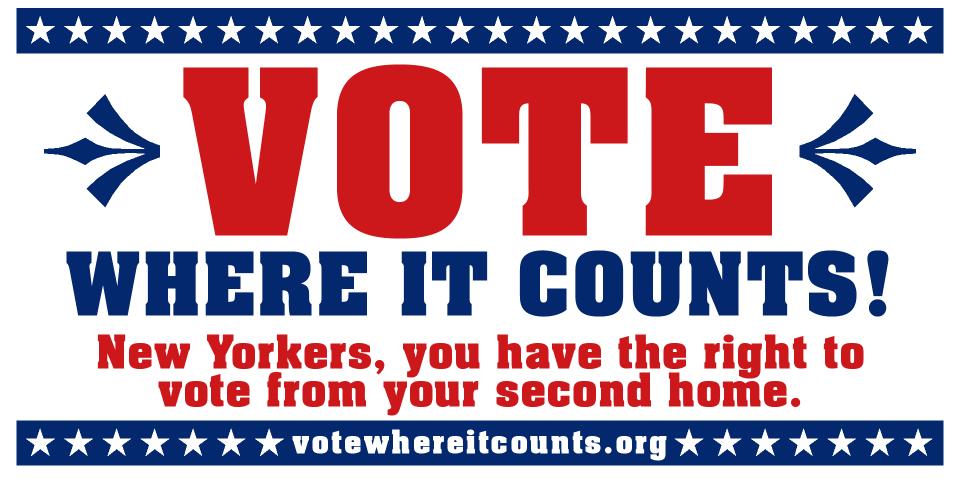ELECTION DAY is NOVEMBER 7, 2023

New York State law is clear.
Citizens with dual residences have the right to choose where they want their vote to Count. Residents DO NOT have to vote where they maintain their primary residence.
Second homeowners have a major stake in the rural communities where they maintain a home, but most have no say in how their tax dollars are being spent, or in decisions that will affect the future of their community for years to come. In swing districts, dual resident voters can determine the outcome of congressional elections.
What the Law Means to Voters:
The term ‘‘residence’’ shall be deemed to mean “that place where a person maintains a fixed, permanent and principal home and to which he, wherever temporarily located, always intends to return.” Election Law § 1-104 [22]
In 1983 the New York State Court of Appeals affirmed a woman’s right to vote in Huntington, Long Island even though she lived elsewhere five days a week. (Ferguson v. McNab, 60 N.Y.2d 598 N.Y Court of Appeals, 1983)
In 2008 the Appellate Division of the NYS Supreme Court ordered the Delaware County Board of Elections to reinstate eight weekend homeowners who had been stricken from the voting rolls. The court noted “Election Law does not preclude a person from having two residences and choosing one for election purposes provided he or she has ‘legitimate, significant and continuing attachments’ to that residence.” (Wilkie et al v. the Delaware County Board of Elections, No. 504004 NYS Sup. Crt. App. 3d, Oct. 23, 2008)
New York Voters also have a right to:
-
Take up to two hours of paid time off to vote if their work schedule otherwise prevents them from voting in person while the polls are open. Voters must tell their employers that they need time off to vote at least two days before the election. N.Y. Elec. Law § 3-110.
-
Bring written or printed materials into voting booths, but not to display or leave campaign clothing, stickers or buttons at the polling place. N.Y. Elec. Law § 17-130(4).
-
Vote free from harassment or intimidation.
-
Take “Challenge Oaths” if someone challenges your right to vote. You have the right to cast a regular ballot if you can complete the oaths required of you. N.Y. Elec. Law § 8-504.
-
Receive instructions from a poll worker on how to use voting equipment before you enter the voting booth. N.Y. Elec. Law § 8-306.
-
Vote without an ID unless you are a first-time voter who registered by mail and did not provide identification.
-
Vote by affidavit or provisional ballot (a paper ballot in an envelope) if you have any problems with your registration.


Leave A Comment